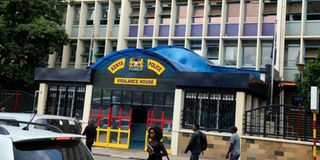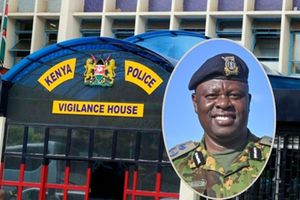
Vigilance House in Nairobi, the National Police Service headquarters. NPSC commissioners have cautioned their successors to be wary of a coup by senior police officers in matters of promotions and transfers.
Had the David Maraga taskforce report on police reforms been fully implemented, the National Police Service Commission’s (NPSC) top brass would have left office six months before the end of their term.
President William Ruto’s action — or lack thereof — on the Maraga taskforce recommendations saw the Eliud Kinuthia-led NPSC bosses complete their six-year term.
The Maraga taskforce stated that the commissioners had failed in their duty by allowing senior police bosses at Vigilance House to take over critical human resource functions.
That alleged hostile takeover by senior police officers saw the NPSC, through inaction, support the very ills it was meant to cure, the Maraga report added.
The taskforce, among other things, recommended a negotiated exit of the current commission.
"Regrettably, however, the NPSC leadership has acquiesced to the continued usurpation of its functions by the NPS leadership, thereby exacerbating the vices it was established to redress," the report said in part.
"It has also generally been unable to develop policies and institute measures that would enable it to perform its constitutional and statutory obligations. The taskforce has been left with no option but to recommend that the government considers a negotiated exit, or any other legally recognised modality, for the current commissioners of NPSC."
President Ruto had promised to fully implement the Maraga report as part of the government’s security reform agenda.
After surviving by the skin of their teeth, and at the tail end of their term, the NPSC commissioners have now handed in their exit report with a word of caution to their successors — be wary of a coup by senior police officers in matters of promotions and transfers.
The report, seen by the Nation, was handed to Dr Ruto last Monday.
After receiving the report, President Ruto said his government would implement some of the recommendations made by the outgoing commission.
In a 15-point advisory to the incoming commissioners, the Kinuthia team held that the issue should be looked into to avoid usurpation of the NPSC’s powers by police bosses.
As promotions and transfers remain a touchy issue in the police service, the exiting commissioners lamented that senior officers at Vigilance House only share a list of promoted individuals after the changes have been made.
Under the law, the NPSC is mandated to conduct promotions and transfers in consultation with Vigilance House.
The exit report noted that police chiefs only forward the list of transferred officers to the commission after the changes have been effected.
The commission recommends that police chiefs should first provide the commission with the names and details of the officers they intend to transfer before the officers concerned proceed with the transfers.
According to the commission, failure by police chiefs to forward the names of officers prior to implementation has led to perceptions that some of the transfers are biased.
To address this problem, the report recommends strict adherence to the transfer regulations by police chiefs.
Dr Ruto said there was a need to continue reforming the police service to ensure that officers are capable of addressing the country’s security needs.
The President noted that the police face challenges such as irregular hiring and skewed promotions.
“Even as we acknowledge this success, we also recognise the challenges that remain and demand our urgent focus and attention. Issues such as irregular police recruitment, budgetary constraints, and the need for a sustainable police welfare programme must be addressed without equivocation,” the President said.
The report did not delve into the effects of the incessant fights between the commissioners and the police leadership.
The exiting commissioners added that the new team should look into the issue of officers who have stagnated in the same rank for a long time.
This, the report said, has affected the morale of police officers, who may feel demotivated and unable to perform their duties effectively. To resolve this, the report recommends that the new commission establish a performance-based promotion criterion in the service.
Mr Kinuthia and his team say they managed to lay a strong human resource system to ensure smooth operations for the 145,000 police officers in the service.
Among the commission’s achievements is the recruitment of 10,932 additional officers to improve the police-to-civilian ratio.
The exiting commissioners further stated that during their tenure, they resolved 1,461 disciplinary cases involving police officers.
Another 724 cases involving officers who had appealed their disciplinary actions were heard by the commission, according to the report presented to Dr Ruto.
The Kinuthia-led National Police Service Commission (NPSC), like its predecessor, was embroiled in frequent clashes with police commanders at Vigilance House.
These tensions escalated in 2024 when 51 civilians employed by the commission were denied access to their offices on the orders of senior police officers.
Then Inspector-General Japhet Koome dismissed the matter publicly, while Mr Kinuthia accused him and his deputies of sabotaging the commission’s operations by skipping key meetings.
At the centre of the conflict is a long-running power struggle over who holds authority to promote police officers.
Despite mediation efforts by then-Interior CS Prof Kithure Kindiki (now Deputy President), including direct talks with both Koome and Kinuthia, the feud persisted.
A planned reconciliation meeting after the Maraga taskforce's criticism of the commission was cancelled, and Prof Kindiki later told Parliament the rift was due to conflicting interpretations of the law—though he appeared to side with Mr Koome.
Mr Kinuthia warned that the unratified promotions could result in disciplinary action.










